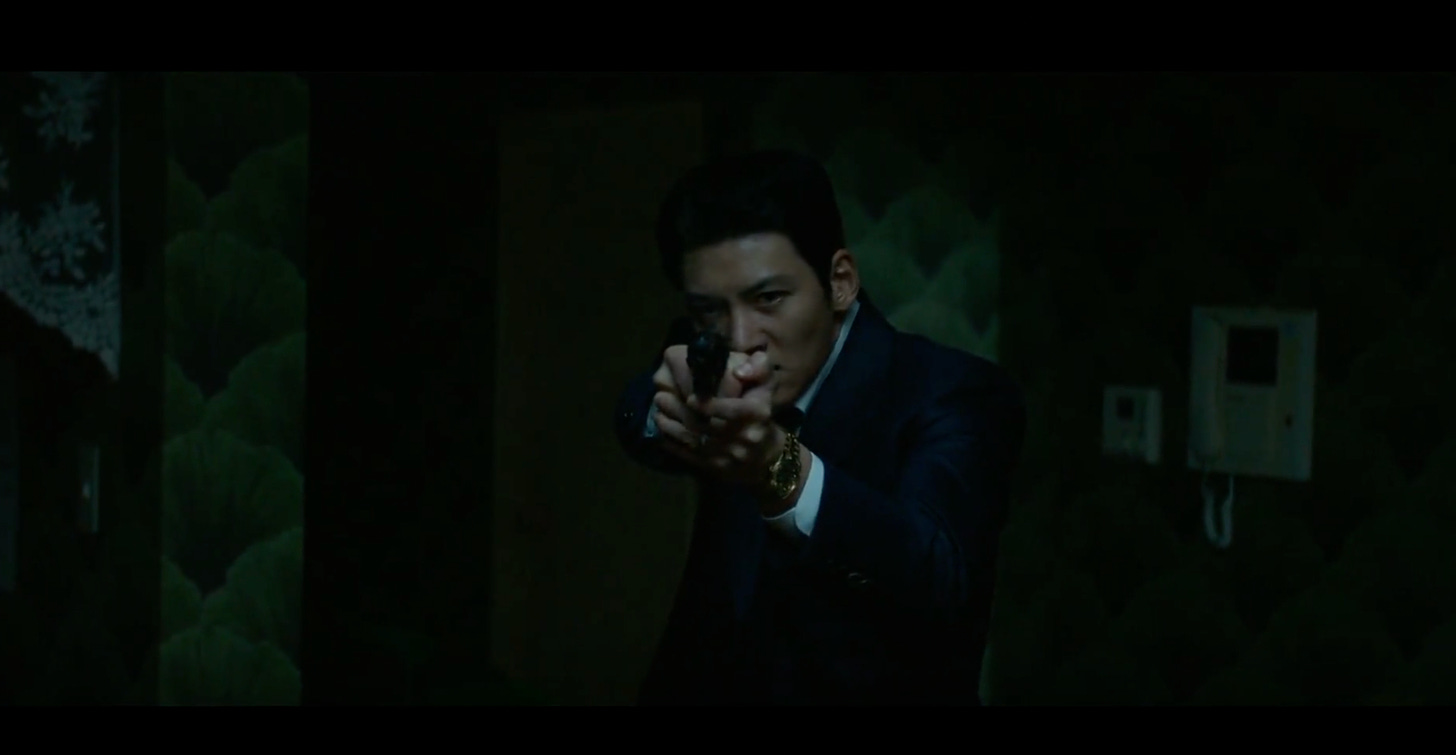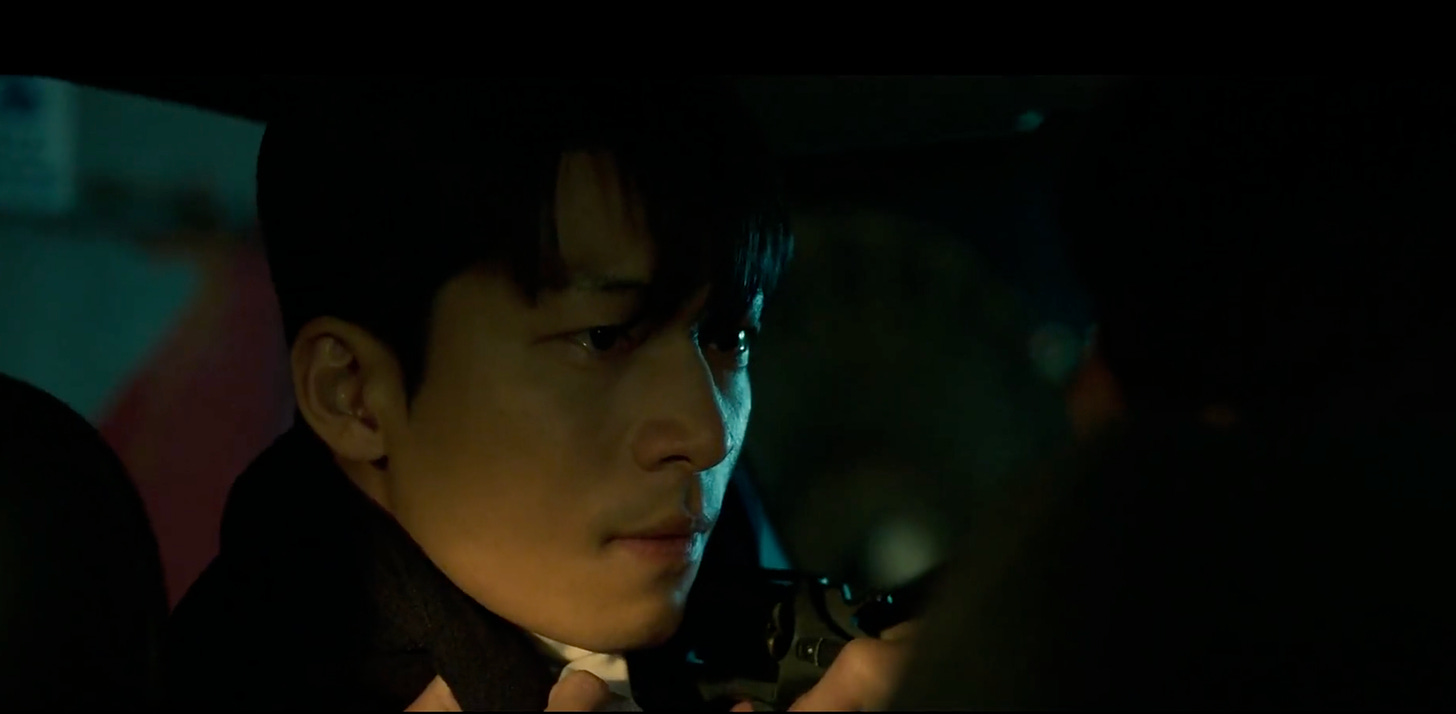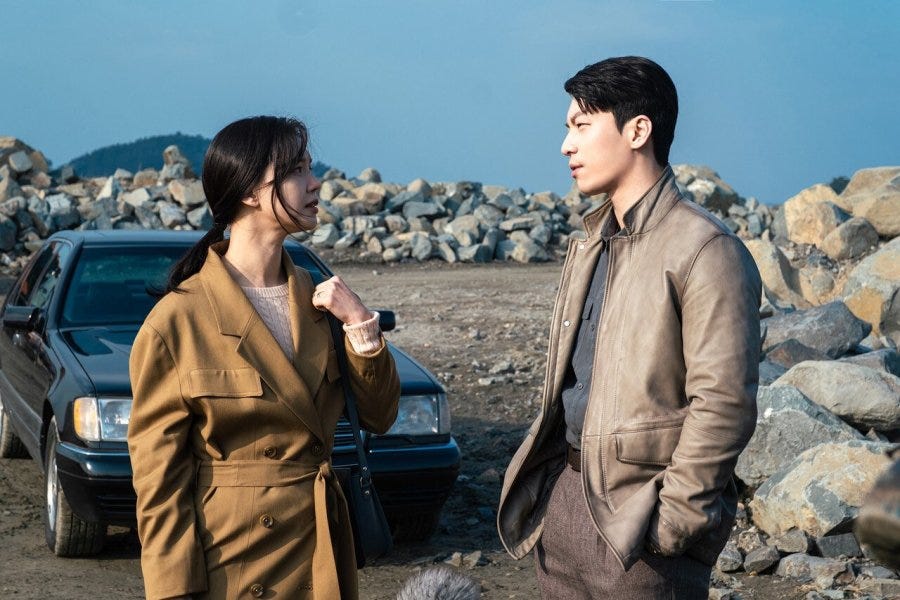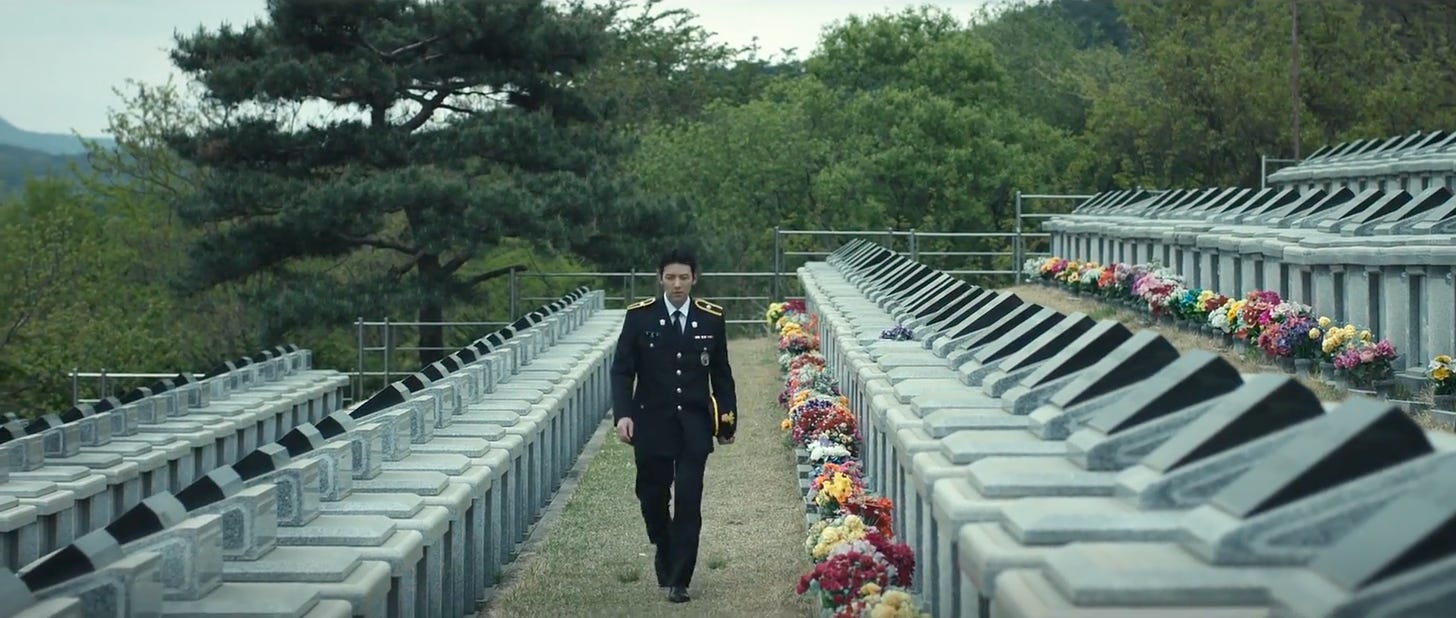I didn’t have huge expectations coming into this but I wanted this to work for Ji Chang-wook and Wi Ha-jun. For the most part it did. Our male leads certainly acquitted themselves wonderfully with thoughtful performances. In general I was entertained by this emotional rollercoaster experience but I would hardly characterise the project as a masterpiece because the plot stripped down to its essence is your garden variety drug trade flick more protracted although there are fascinating twists and implicit repudiations of standard K drama tropes. In the final analysis what elevates this show for me are its messaging and themes.
***Spoilers Ahead***
In ways explicit within the narrative The Worst of Evil is a Christian allegory about greed, desire and the road to destruction. While the world-building revolves around cops and gangsters playing cat and mouse, at its core is a cautionary tale of two men and their problematic relationship with success — and a particularly narrow view of what that looks like. Both men crave success not for its own sake but in order to attain that Holy Grail of respectability. The desire for respectability propels them forward right to the bitter end. Success, whatever form that takes, opens the door to acceptance by their betters and their peers. Jung Gi-cheul, in particular, is the poster child for this. Raised in the church and at some point a choir member, he would have been schooled in that often misquoted admonishment found in the New Testament. “The love of money is the root of all kinds of evil which while some coveted after, they have erred from the faith, and pierced themselves through with many sorrows.” (1 Timothy 6:10, KJV) His pursuit of wealth in order to gain respectability in a world that values status as well as to win over the woman he loved, took him off the straight and narrow. In an act of bald expediency he veered away from the teachings of his youth to accumulate wealth in record time. The crosses which he keeps everywhere despite not darkening the door of his old church, are the restraints he imposes on himself which manifests in this odd but resolute preoccupation with trust. It’s a quirk and an itch. (I’ve discussed this in another post) In spite of being flushed with cash he pays the price for those choices — the respectability he desires is not so easily attained and the trust he seeks eludes him. He cannot in all good conscience approach the woman he loves. So yes, he has inflicted himself with all kinds of unnecessary suffering through the means he accumulated his wealth. At first he doesn’t hold out much hope for himself until Eui-jeong re-enters his life. When she throws him a lifeline, he grabs it with both hands believing that redemption is on the cards. A case of hope triumphing over reason. A false hope built on a house of cards. This indicates that he never wanted to be any kind of crime boss because the veneer of respectability mattered much more.
In the case of Park Jun-mo, he’s perhaps more fortunate in that he has another persona Kwon Seung-ho to play out some of his darker impulses. His rationale for going undercover was promotion and the hope of gaining the respect of his irascible in-laws. Once he’s in the thick of the game he finds a kindred spirit in Jung Gi-cheul who in turn sees something of himself in Seung-ho — the drive and the eagerness to succeed in particular.
It is a tale of two men with very similar motivations in different circumstances. Both crave respect and ironically both find it in crime. Park Jun-mo lives on the edge as a cop hunting criminals venting his violent impulses on the job. Going undercover puts him in the position where all those tendencies are given a safety valve. Jun-mo is not a "good" man but a cop with a dysfunctional past. But when he infiltrates the gang, he has a taste for the life of crime and revels in it. There he finds someone he could have been -- Jung Gi-cheul, someone who understands him better than anyone -- more than his wife, more than his mentor Capt Seok. In fact he could have lived the life Jung Gi-cheul did considering that his father is some kind of minor drug figure. Temptations to cross all kinds of lines abound and his wife instead of being a lifeline in the undercover gig, becomes another trigger for all the the worst aspects of his personality. In Jung Gi-cheul he sees himself gone astray. In Jung Gi-cheul he gains some measure of respect where his ability to think on his feet and “loyalty” is rewarded.
The finale was surprising. It was dark. Darker than what I had expected. I wouldn’t say it completely changed the way I saw the show but it certainly led to a rethink of the love triangle. I certainly didn’t expect Gi-cheul to have his happy ending considering all the things he was a part of, approved of and did. Last week I opined that Eui-jeong's inclusion in the investigation was not a matter for rejoicing. Indeed it was allowed to play out tragically. Indeed it was a deliberate device... a very subversive overturning of the beloved first love trope. Shock. Horror. She tried to be a lifeline to two men and in the end couldn't hold on to either. The deception. The guilt as a result of deception. Gi-cheul’s rant that he was betrayed. All of that would haunt her in days to come. I doubt that the show was in agreement with Gi-cheul’s perspective on this or was bestowing on him martyrdom creds. If anything the gloss of him being a victim of circumstances came off because Jun-mo gave him his second chance at a normal life and he refused to take it. To add insult to injury he tried to “curse” the leads for betraying his trust ie. doing their jobs as undercover cops. He didn’t take responsibility for his wrongdoings nor did he even try to see things from their point of view. All he wanted to do was condemn them in perpetuity by taking his own life by with the goal of making their lives hell on earth. While Jun-mo put a stop to this invective with a bullet to the chest, sad to say Gi-cheul succeeded in further deepening the cracks between the couple because in the end they most likely went their separate ways. Redemption was within reach and Jung Gi-cheul was unrepentant to the last.
The reality was it was a dangerous game they all played. Gi-cheul should have known that better than anyone. He should have kept his big boy pants on. He knew the risks. He was doing illegal things with very unsavoury people. He was stabbed in the back more than once by his “partners”. He was warned against trusting Seung-ho and Eui-jeong but that advice went largely though not entirely unheeded. He killed at least one person and knew where all the other bodies were buried. And suddenly at the 11th hour he wanted in on the Oppression Olympics? Cry me a river. He gambled and made the biggest mistake of his life. He paid for it in full.
Betrayal hurts. Especially for a guy who put a lot of stock in loyalty and trust. That’s true. He backed the wrong horses. That’s also true. But in the end it’s clear that Gi-cheul was more upset about losing to the undercover cops than wanting a second chance to make a different set of choices.
From the online commentary it feels as if Eui-jeong is held to a different standard to Jun-mo as far as undercover difficulties are concerned. Perhaps it’s different sets of people doing different types of blaming. Both husband and wife put themselves in temptation and harm’s way to get the job done. Eui-jeong sincerely thought she was doing the right thing when she inserted herself into the investigation. Jun-mo was almost killed for his troubles. She assumed that the prosecution and police were doing a subpar job of protecting him. And I can’t disagree. They were inexperienced and under resourced. All throughout they did a poor job handling Hwang Min-goo the smug corrupt cop that was sniffing around all the key individuals involved. And Captain Seok (aka Gil-chae’s husband) was another casualty in the cause. On hindsight her inclusion in the op was fraught with issues but they were short-handed and she did manage to distract Gi-cheul with varying degrees of success. But like everything else, whether for good or ill, there would be consequences. Yes, the cartel was taken down in one fell swoop and the chief prosecutor can bask in the glory of heading up that op. Still it did come at a high price to those who were on the frontlines.
When Eui-jeong told Gi-cheul that she loved him, it is instructive to note that she had a pistol in her handbag. He on the other hand had a gun in his jacket pocket. This is a point that needs to be reiterated because she needed a way to protect her cover knowing full well that he was suspicious of her and digging up information. She absolutely used their past relationship to hook him and reel him in as it was the only currency she had in this situation. She hadn’t seen him in years. She hadn’t plan to see him again but they almost blew Jun-mo’s cover when the two of them met at that eatery. There is a larger context at play that brought the three of them to where they got to in the finale. If she was really “in love” with Gi-cheul at the end as some of the online “chatter” insists, she should have admitted to Gi-cheul that she was deceiving him and tried to persuade him to run away with her much earlier. None of that happened. She stood with Jun-mo in the final confrontation. She tried to talk Gi-cheul into giving himself up. Of course she grieved for him in the end as he bled to death. For old times sake and for the man he had become. I wouldn’t go so far as to say that she didn’t care at all but whatever affection she did have for him paled into comparison to the ethics and values she held to as a cop and a wife. If she had any intention to “cheat” as is the accusation, Gi-cheul and Eui-jeong would now be sipping champagne in some unknown location in the Pacific.
At the end of the day, Jun-mo showed himself to be the better man. He suffered through the crucible of temptation, overcame obstacles and near death experiences to come out the other side purified. He never forgot he was a cop. He was gracious to his rival and protected his wife to the end. He passed… with flying colours and protected his integrity as a police officer but not without making a whole lot of personal sacrifices.







Thanks for yet another insightful analysis!
Man, this show was so intense and bleak. Initially I was surprised Jun-mo didn't catch any flak for letting Gi-cheul go. Like it was a little too convenient Jang-bae usurped Gi-cheul's position to become the leader right before the arrests, and even more so when the prosecutor announced they'd arrested all the important people but didn't mention anything about Gi-cheul still at large. Then the consequences came crashing down ... the writers certainly followed through on that front!
And on a side note, I was so disappointed by the double standard and amount of vitriol directed solely toward Eui-jeong. We've still got a long ways to go as people.